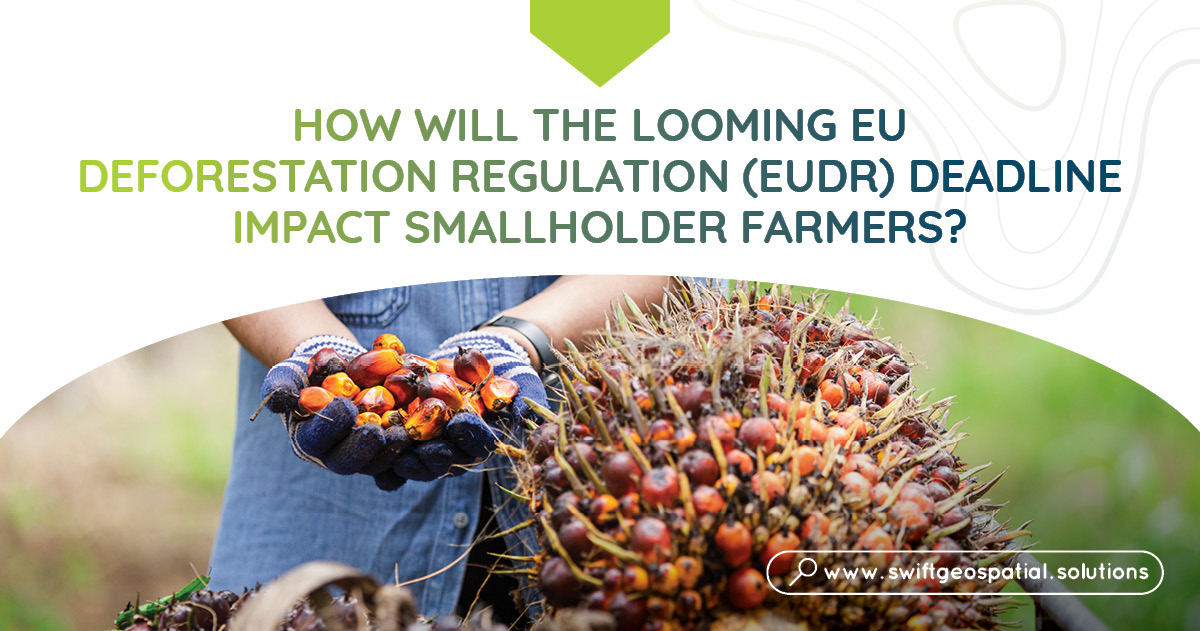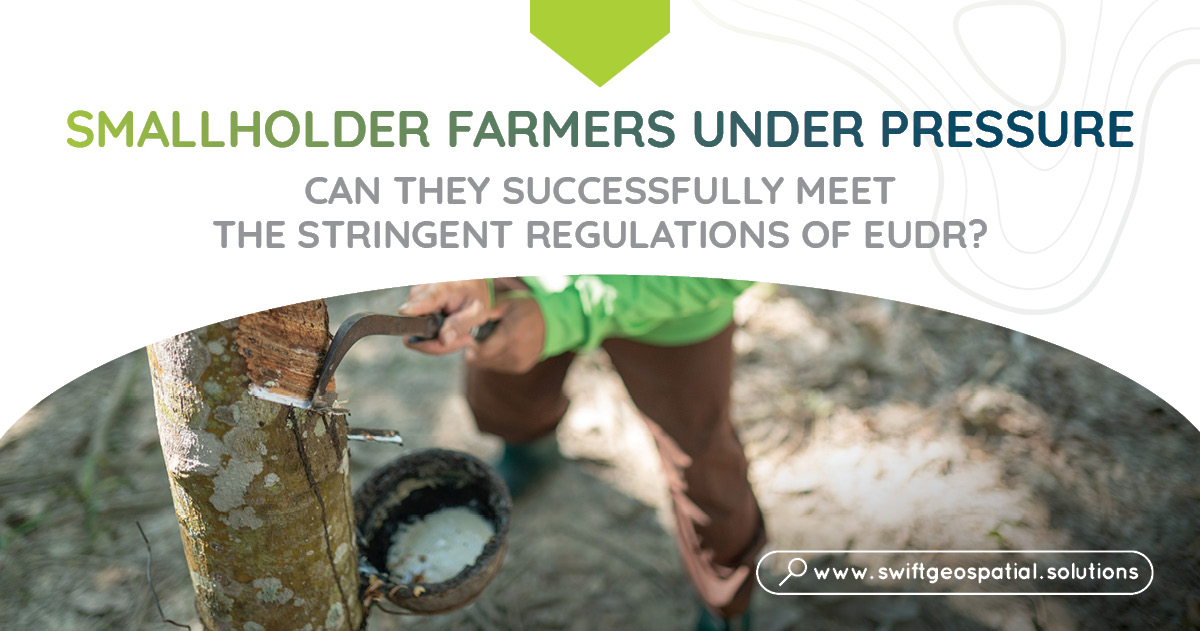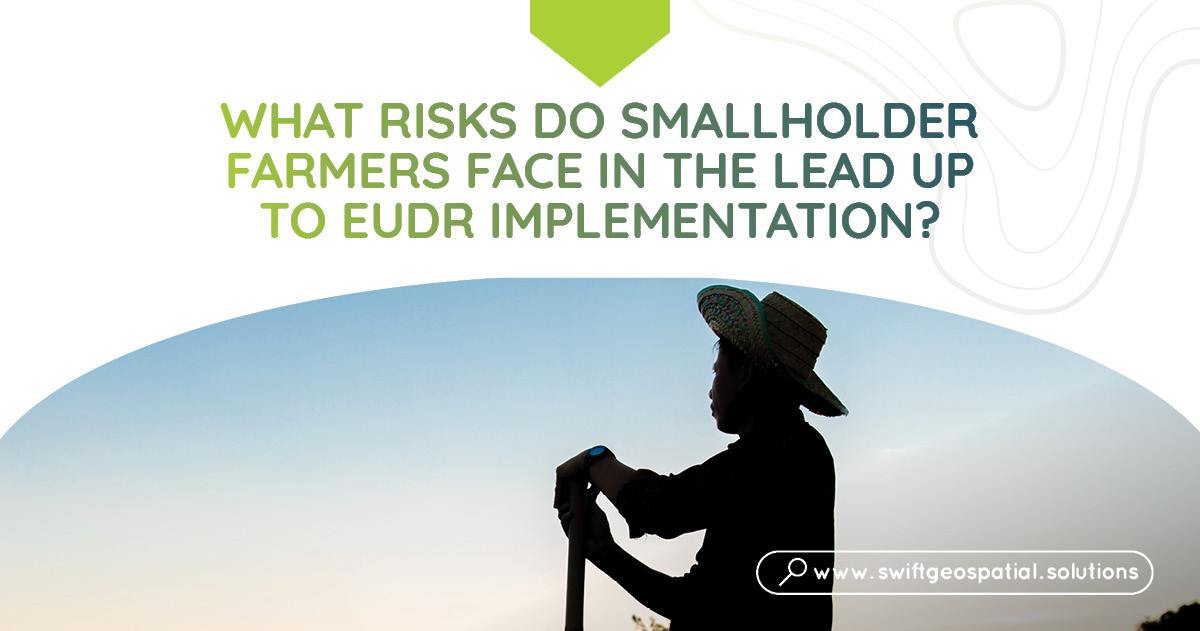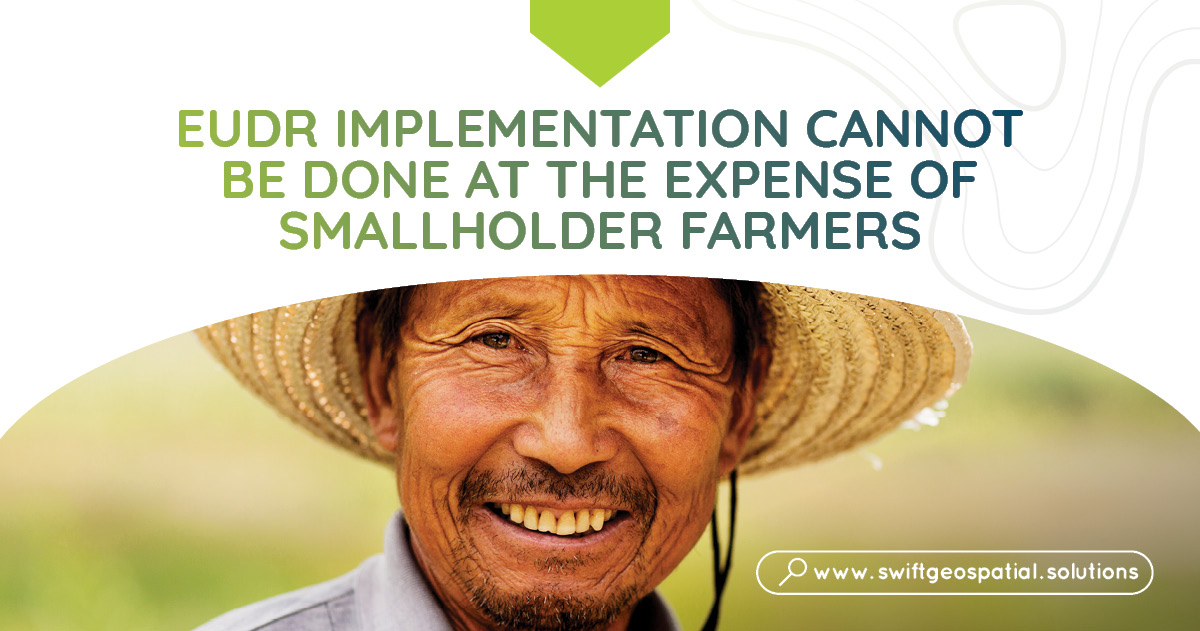
How will the EU Deforestation Regulation impact smallholder farmers?
The European Union Deforestation Regulation (EUDR) implementation deadline is fast approaching on 30 December 2024. Can smallholder farmers rally to meet the regulation requirements while under such time pressure, and facing other challenges such as a lack of financial resources, and technological and regulatory support?
Categories:
Date Posted:
April 2, 2024
How will the EU Deforestation Regulation impact smallholder farmers?
The European Union Deforestation Regulation (EUDR) implementation deadline is fast approaching. By 30 December 2024, suppliers of certain commodities to the EU must comply with regulations certifying these commodities and their by-products as deforestation-free.
Commodities listed under the regulation include soy, cattle, palm oil, wood, cocoa, coffee and rubber which are all classed as high-risk on the deforestation scale.
However, there are rumours that the EU may delay this deadline due to supplier country concerns around practicality, technology, cost, supply chain challenges and other factors. Smallholder farmers are the ones who will be particularly hard hit by the stringent regulations if they aren’t given the time and requisite support needed to comply.
Regulations require suppliers of the listed commodities to provide geolocation data of the land where commodities are harvested. This is just one measure, but it already places a technological burden on smallholder farmers, some of whom do not have access to the internet or digital technology at the most basic level, like cell phones. Other regulations include needing to carry out risk assessments and mitigating risk by “carrying out independent audits or working with suppliers to help build capacity,” says the Innovation Forum.
Unless smallholders are taken under the wing of bigger suppliers or provided with appropriate regulatory, financial and technological support, many will fail EUDR compliance with devastating consequences for livelihoods. And smallholders are already incurring costs. For example, in Malayasia, smallholders face compliance costs to attain government-mandated Malaysian Sustainable Palm Oil certification. More needs to be done to ensure smallholders are not left behind as EUDR moves forward.

The importance of smallholder farmers
Eighty-five per cent of the world’s rubber is produced by close to 6 million smallholder farmers. The EU “consumes over a million tonnes of natural rubber every year,” depending entirely on imports that largely come from these farmers, says Preferred By Nature. One can already see a looming supply crisis if smallholders cannot comply with EUDR, never mind the negative consequences for smallholders now unable to sell to the European Union from a financial standpoint.
In the case of palm oil, smallholders account for 35% to 40% of the global production but have a much smaller footprint in the European Union due to palm oil certifications and guidelines already in place, such as the Roundtable on Sustainable Palm Oil, which means the bulk of palm oil entering the EU can be traced back to the plot of land on which it was produced. Smallholder farmers are often unable to produce this level of traceability and data, and EUDR will only further exclude farmers from the EU market as additional traceability and due diligence requirements add pressure.
EUDR will place some countries in a particularly difficult position on the smallholder farmer front. Vietnam has “more than 2 million smallholders operating across roughly 6 million plots of land engaged in the country’s three major forest-related commodities” which are timbre, rubber and coffee says Mongabay, and EUDR will dramatically impact all of them.
These smallholders aren’t just significant as suppliers to the EU but also for the role they play in local communities, helping to break poverty cycles, increase trade and investment and aid in job creation. These are insights from Professor Lloyd Baiyegunhi from the University of Kwa-Zulu Natal, who stressed that increased access to capital, improving infrastructure and improving the rate of technology adoption are crucial in elevating the position of smallholder farmers to be able to effectively compete as suppliers to a global market.

The risk smallholders face
On the most basic level, many smallholder farmers are unaware of the EUDR or its implications. In interviews conducted in Thailand and Indonesia by the Regional Community Forestry Training Center for Asia and the Pacific, “smallholder groups and cooperatives have received little information from other actors in their supply chains about the EUDR and its requirements” and many are unaware that it is a compulsory regulation and not a voluntary certification scheme. This points to a huge educational misstep on the part of EUDR and other country-specific institutions in disseminating the correct information to smaller players across the seven high-risk commodities.
Although smallholders often sell through farmer groups and cooperatives, many use middlemen to move commodities up the supply chain, and it is here where formal records and transaction details are often flimsy, making it impossible for them to comply with EUDR regulations. Across the seven commodities listed under EUDR, almost all have complex supply chains with numerous intermediaries peppered throughout, from the production site to final export. Holding each one accountable (often with evidence required by EUDR) may not always be practical, especially when smallholders face corruption, lack of legal acumen and digitalised record-keeping.
Mongabay also points out another risk: traders ending relationships with smallholders they see as high risk under the EUDR. According to the regulation, a benchmarking survey will categorise countries and regions across three deforestation risk rankings – low, medium and high. Each classification level comes with due diligence steps that either need to be completed in full, or that can be completed in part depending on this risk ranking.
A higher-risk country or region has a longer list of requirements, including risk assessments, mitigation plans, and more. Smallholders simply won’t be able to complete all the measures required to meet compliance criteria, which means traders not only ending relationships but also switching to “larger, less scrupulous and less ethical suppliers but with larger capital to comply,” says Mongabay.
During the second Meeting of the Ad Hoc Joint Task Force on EUDR, Deputy Secretary General (Plantation & Commodities) Dato’ Zailani Bin Haji Hashim reinforced that more must be done to accommodate smallholder farmers, particularly in rural areas: “leniency towards them is crucial, [as is] considering deferring implementation [of EUDR] and providing targeted technical and capacity-building support.”
The goals of EUDR are both admirable and necessary – curbing deforestation, forest degradation, and general environmental and human rights infractions in the production and consumption of the seven high-risk commodities. But it cannot be done at the expense of smallholder farmers, who don’t just play a significant role in supplying the EU with palm oil, timber, wood and more, but in supporting lives and livelihoods in their respective countries. Our goal should be towards inclusion and a sustainable rollout of EUDR with smallholder farmers recognised.

Is Your Business Ready?
With the approaching EUDR deadline less than 12 months away and well-known repercussions, have you asked yourself if your business is ready to comply? Contact Swift Geospatial; our solutions-based team is looking forward to assisting you with all of your ongoing satellite-based monitoring needs.
Swift Geospatial look forward to attending and exhibiting at the World Cocoa Conference 2024 in Brussels, Belgium. To be held from the 21st-24th April 2024.
The foremost gathering for the worldwide cocoa and chocolate industry, this event unites every participant in the cocoa value chain. Governments, cocoa farmers, cooperatives, exporters, traders, manufacturers, brands, retailers, financial institutions, logistics companies, international aid and development agencies, academics, and more come together from around the globe. The purpose is to foster dialogue, exchange perspectives, and collaboratively pinpoint solutions for ensuring the sustainability of the sector.





